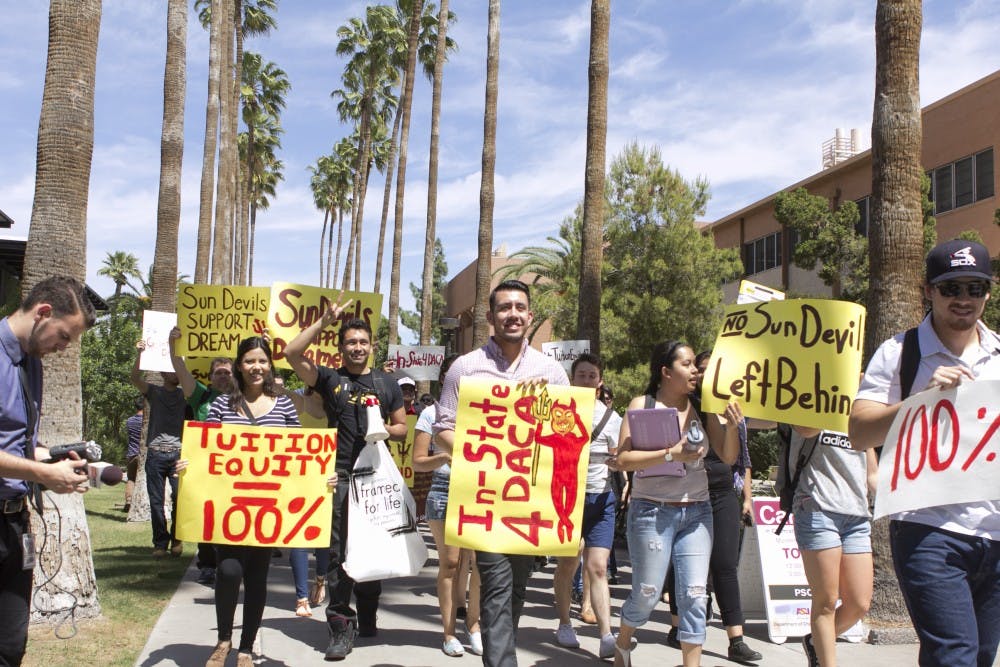While ASU students scurried to and from class on Tuesday afternoon, a group of 100 students and community members marched through the heart of the Tempe campus calling on the Arizona Board of Regents to give deferred action recipients in-state tuition rates.
Student organizations including DREAMzone, the Arizona Students' Association and MEChA gathered to show solidarity for students who have received legal status under the Deferred Action for Childhood Arrivals policy.
The Deferred Action for Childhood Arrivals policy was enacted by President Barack Obama in 2012 and gave lawful presence to those who had lived in the U.S. since 2007, came to the U.S. before age 16 and have a GED or high school diploma. These students are still required to pay out-of-state tuition rates, though many have lived in Arizona for the majority of their lives.
ASU online student Korina Irbe is a member of the Arizona DREAM Act Coalition, which seeks to make higher education more accessible for immigrants. She called on the Arizona Board of Regents to follow the Maricopa Community Colleges’ lead and grant in-state tuition for DACA recipients.
Maricopa Community Colleges had allowed DACA recipients to pay in-state tuition because their federal work permits could be used to establish lawful presence. However, Tom Horne filed a lawsuit against them in 2013, which required them to stop doing so.
“Now it’s time for the Board of Regents to take the same leap and show. … They will stand behind DACA recipients because we are Sun Devils, too,” Irbe said.
Supporters, who were carrying signs and chanting “D-A-C-A, fair schooling is what we say,” walked down Palm Walk toward the Memorial Union. Past, present and future ASU students also shared their struggles trying to pay the $24,000 out-of-state tuition rate compared to the yearly $10,000 in-state rate.
Pre-med senior Junive Gill said she had received many scholarships and offers that would have been able to help her pay for school when she finished high school, but she was unable to accept them because of Proposition 300, which Arizona voters passed in 2006.
Proposition 300 ruled students could not accept federally funded financial aid or qualify for the in-state tuition rate.
“I walked across the stage at my high school graduation in tears because I didn’t know where I was going to go (after high school),” Gill said.
Gill now works multiple jobs to pay her tuition while still trying to balance her course load.
“I ask the Arizona Board of Regents to follow in the steps of MCC, because I don’t want anyone to go through what I went through the past four years with the stress and the tears,” she said.
She said the restrictions create a barrier for students interested in pursuing a higher education and working for a better future.
“Education should be for everyone,” Gill said. “Our (immigration) status shouldn’t be an obstacle.”
Chandler-Gilbert Community College student Belen Sisa said she hopes to transfer to ASU soon to pursue a political science degree but is concerned about how she will be able to pay for tuition.
Sisa said after receiving different college and scholarship offer letters, she felt disappointed because she could not accept what should have been the rewards for her hard work and efforts.
“If tuition is not made affordable, my education will come to a halt … and I won’t be able to give back to this state I call home,” she said.
The group said they will be present at the next ABOR meeting on April 9 to speak with administration and share their thoughts.
Reach the reporter at sgslade@asu.edu or follow @shelbygslade on Twitter.
Like The State Press on Facebook and follow @statepress on Twitter.




